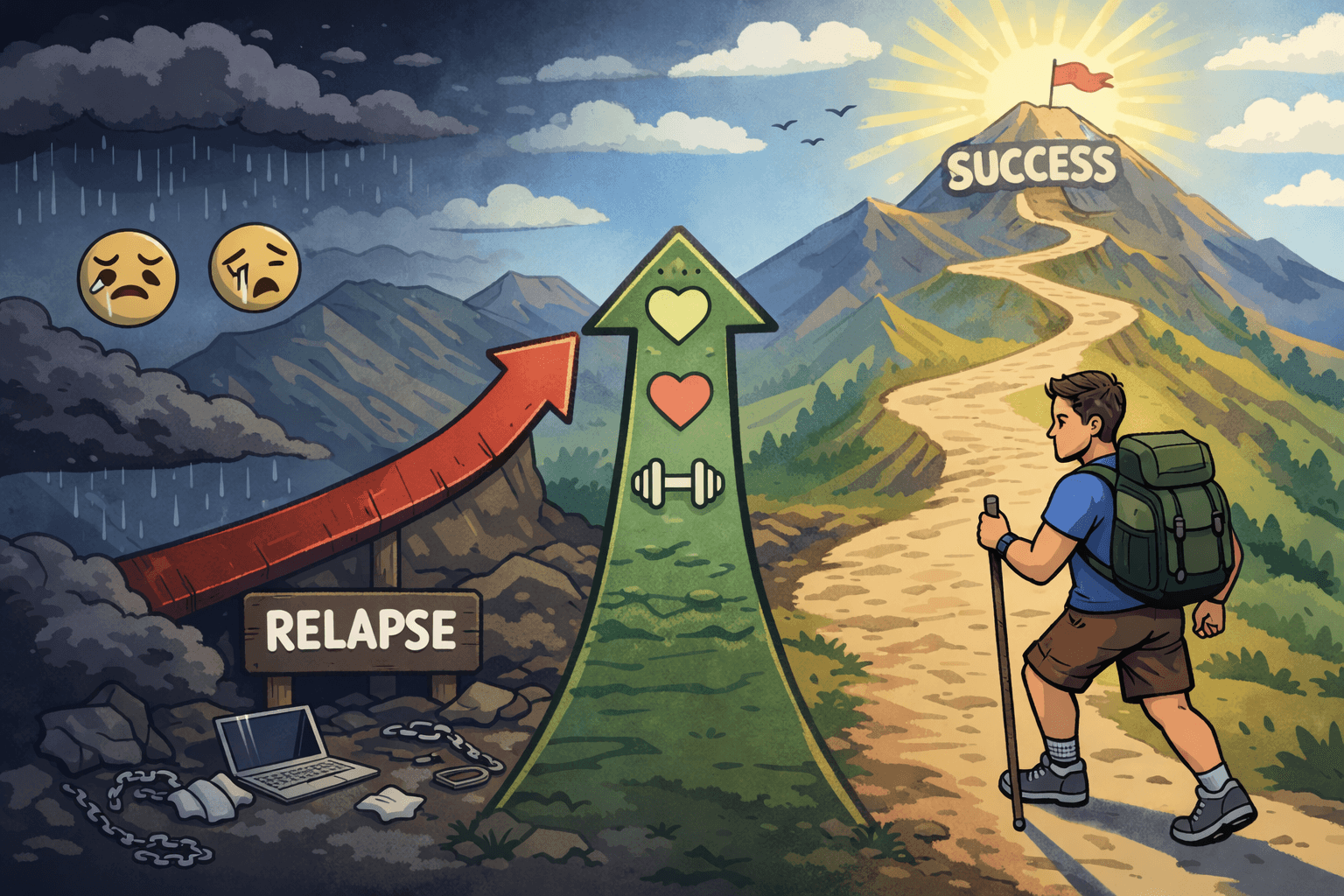
Resetting your brain from porn means reducing cue-driven urges, restoring reward sensitivity, and strengthening impulse control.
Further reading: What happens when you stop watching porn
Many people notice early changes in 2–6 weeks, with steadier improvement over 2–6 months, and long-term resilience developing over 6–12+ months—depending on stress, habit duration, and support.
Here’s a realistic, research-informed recovery timeline (common patterns, not guarantees)
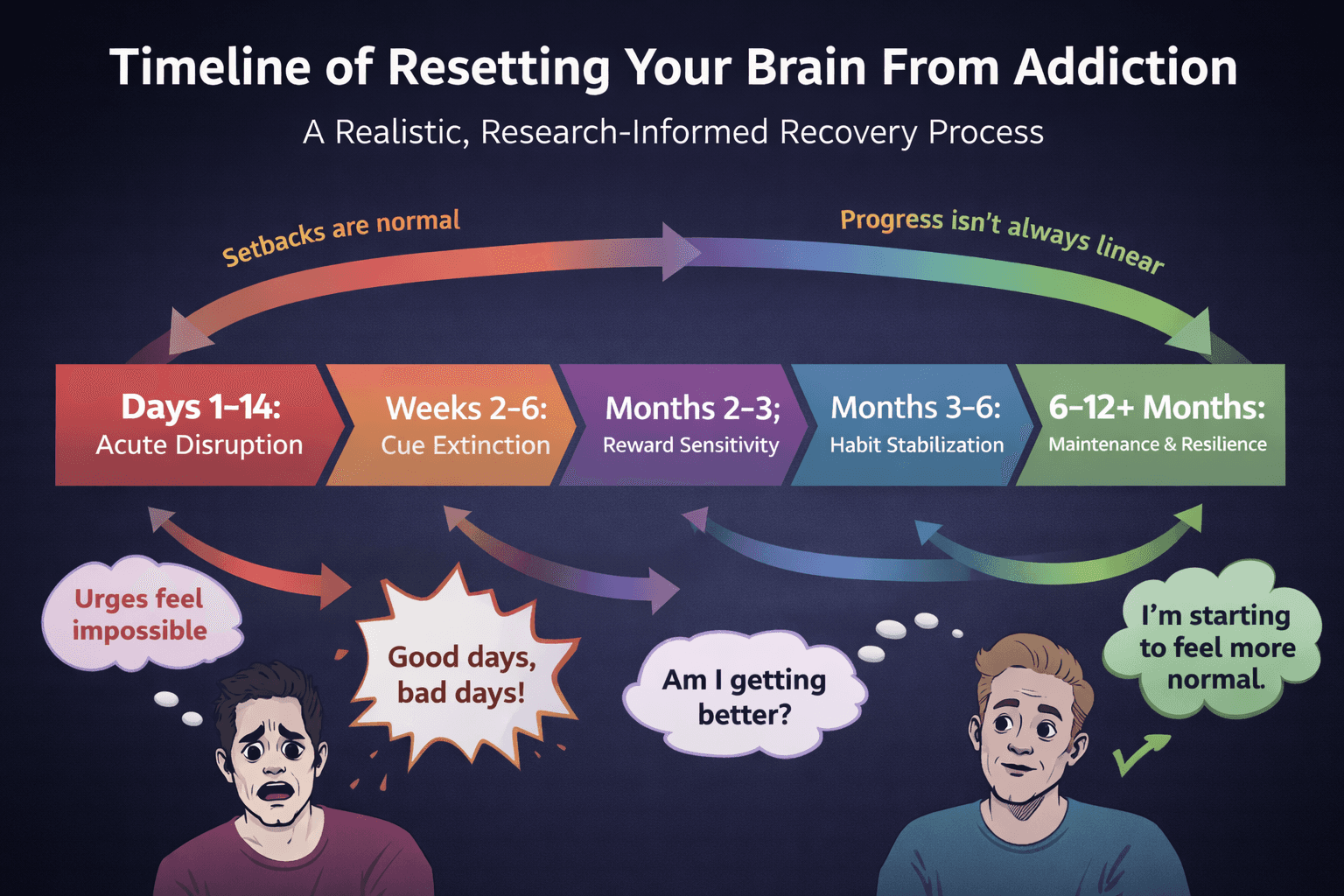
Stage | What you may notice | What helps most | Get support if | |
Days 1–14 | Urges feel frequent or “loud,” irritability/restlessness, sleep disruption, mood swings, brain fog, strong cue-triggering (late night, being alone, stress). | Remove easy access (blockers + device rules), tight daily structure, short “urge interrupts” (walk, cold rinse, breathing), early bedtime, avoid high-trigger scrolling/sexual content. | If urges feel unmanageable, you’re using to cope with panic/depression, you can’t stop bingeing after slips, or you’re having thoughts of self-harm. | |
Weeks 2–6 | Urges become more cue-specific (stress, boredom, loneliness), mood variability (good days/bad days), cravings shorter but still sharp, improved awareness of triggers. | Trigger map + plan (If X then Y), replace porn with rewarding routines (exercise, social, work blocks), accountability check-ins, learn urge surfing / ACT skills. | If you’re stuck in a weekly relapse loop, your relationship or work is taking hits, or shame/anxiety is escalating despite structure. | |
Months 2–3 | More “space” between urge and action, improved focus, more enjoyment from normal rewards, fewer automatic urges; occasional spikes during stress or after orgasm (“chaser”-type periods). | Identity + environment work (who I’m becoming), strengthen stress regulation (sleep, exercise, therapy skills), re-build intimacy habits, tighten high-risk windows (late nights, travel). | If sexual function concerns (ED/anxiety) are persistent and distressing, if compulsive use is tied to trauma, or urges are driving risky behavior. | |
Months 3–6 | Habit feels weaker, triggers less sticky, more consistent mood, show-up energy returns, slips (if any) feel less compelling; confidence rising. | Maintenance systems: weekly review, relapse plan, strengthen relationships/purpose, reduce isolation, keep friction high on porn access, keep healthy rewards consistent. | If progress stalls, you’re white-knuckling with high stress, or you’re replacing porn with another compulsion (gaming, substances, risky sex). | |
6–12+ months | Long-term resilience: urges infrequent, faster recovery from spikes, stable routines, more flexible sexuality; occasional “out of nowhere” cravings during major stress. | Long-game prevention: stress-proofing, meaning/purpose, community, periodic check-ins, guardrails during transitions (moves, breakups, layoffs). | If major life stress triggers relapse patterns, if intimacy/relationship issues remain unresolved, or if you want structured help to prevent backsliding. |
If you want the science: scroll down to see what changes in cue-reactivity, reward sensitivity, and impulse control.
Further reading: How long does it take to recover from porn addiction

What “Resetting Your Brain” From Porn Addiction Actually Means
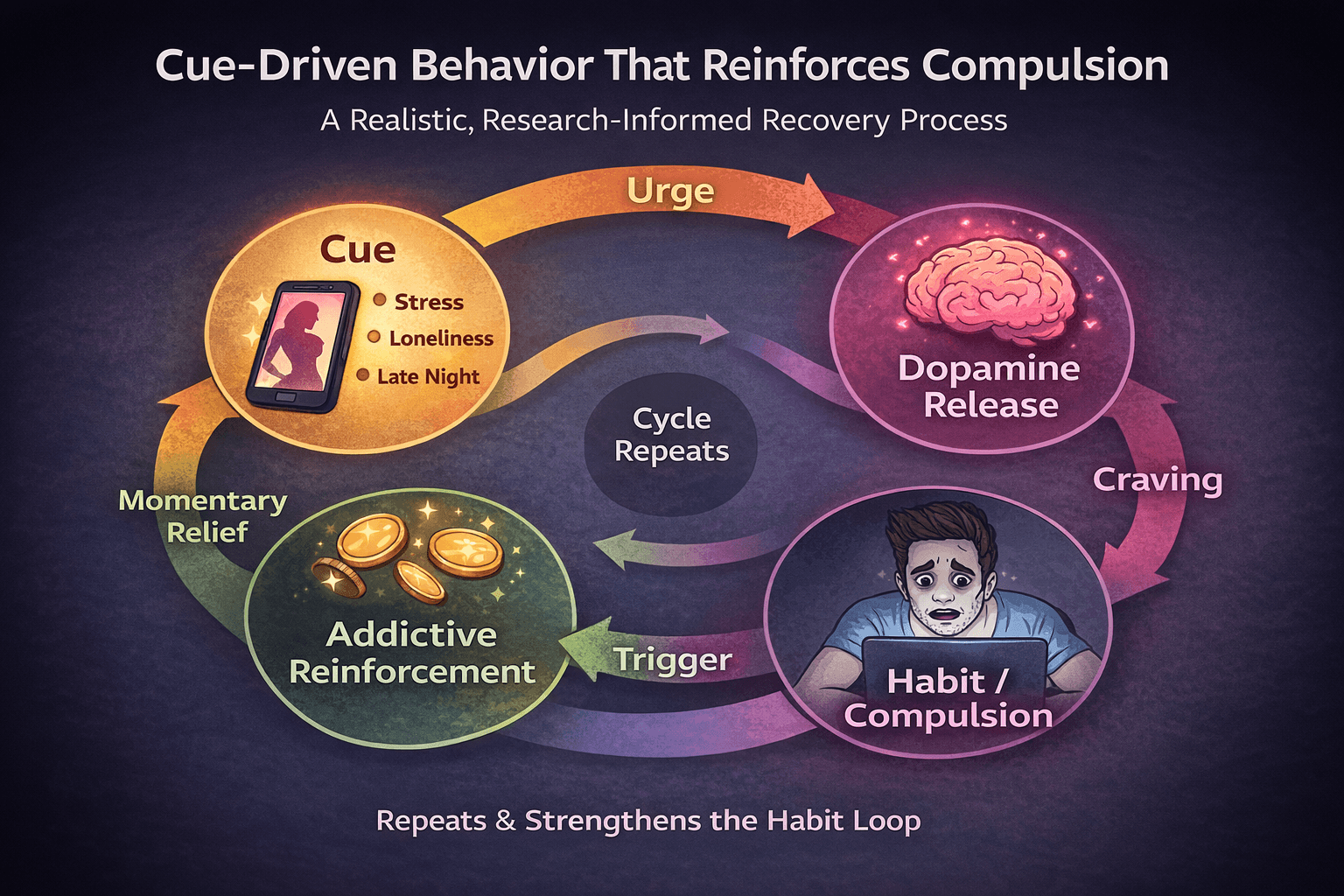
When people talk about “resetting” the brain from porn addiction, they are usually not referring to erasing memories, eliminating sexual desire, or returning the brain to a blank state.
In a clinical sense, a brain “reset” is a gradual shift in how strongly certain cues trigger urges, how rewarding pornography feels relative to other activities, and how much control a person has over their behavior.
More specifically, recovery tends to involve changes in several key areas:
Reduced cue-reactivity
Porn-related triggers—such as being alone with a device, boredom, stress, or late-night scrolling—gradually provoke weaker and less automatic urges.
Further reading: How to use urge surfing to quit porn addiction faster
Improved reward sensitivity
As compulsive use decreases, the brain often becomes more responsive to everyday sources of pleasure, such as social connection, physical activity, creativity, and meaningful work.
Stronger impulse control
Sustained reduction in compulsive behavior is associated with improved functioning of the prefrontal cortex, particularly regions involved in cognitive control, error monitoring, and decision-making.
What resetting your brain after porn is NOT
A “reset” does not mean the complete disappearance of sexual thoughts, attraction, or libido. Sexual desire is a normal part of human biology. Recovery focuses on separating sexuality from compulsive patterns and restoring flexibility and choice, not suppressing desire altogether.
It’s also important to understand that progress is rarely linear.
Further reading: NoFap flatline
Urges may fluctuate, temporary setbacks can occur, and improvement often happens in stages rather than all at once.
It’s best to think of resetting the brain as a process of gradual, sustained recalibration rather than a single moment or sudden change where everything returns to normal.How Does Pornography Affect Your Brain?
How Porn Addiction Changes the Brain
To understand how the brain can recover from compulsive pornography use, it helps to first understand what changes occur during the habit itself.
These changes are not unique to pornography, but certain features of online porn—such as constant novelty, accessibility, and high-intensity stimulation—can accelerate and reinforce these changes to mimic addictive behaviors observe in substance abuse and other compulsive behaviors.
The Brain’s Reward System and Dopamine
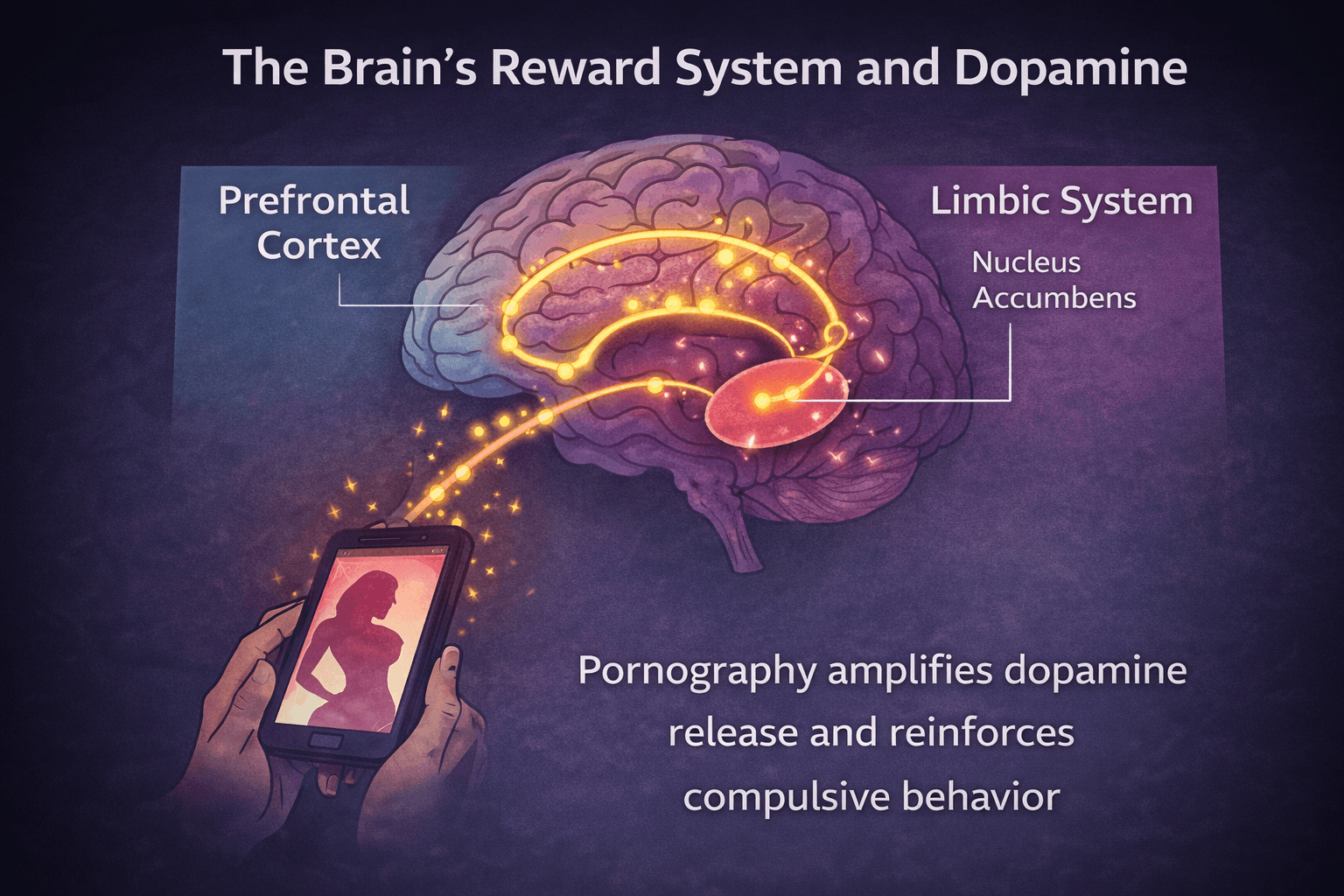
The brain has a built-in reward system designed to reinforce behaviors that support survival and well-being, such as eating, bonding, and learning. Dopamine plays a key role in this system by signaling motivation, anticipation, and reinforcement. When an activity consistently produces a strong reward signal, the brain learns to prioritize it.
Pornography can strongly engage this system. Sexual arousal and orgasm naturally involve dopamine release, but internet pornography often amplifies this effect through novelty, explicit intensity, and endless availability.
Over time, repeated exposure can train the brain to associate porn-related cues—such as specific websites, devices, emotional states, or times of day—with a strong expectation of reward.
Conditioning, Cues, and Habit Formation
Much of compulsive porn use is driven by conditioning rather than conscious choice. Through repetition, the brain links certain triggers (stress, boredom, loneliness, fatigue, or privacy) with pornography as a quick source of relief or stimulation. Once these cue–response patterns are established, urges can arise automatically, even when a person no longer wants to engage in the behavior.
This process is similar to how other habits form. The brain learns, “When X happens, do Y to feel better,” and that pattern becomes increasingly efficient with repetition.
Over time, urges may feel less like deliberate decisions and more like reflexive responses.
Novelty and the “Superstimulus” Effect
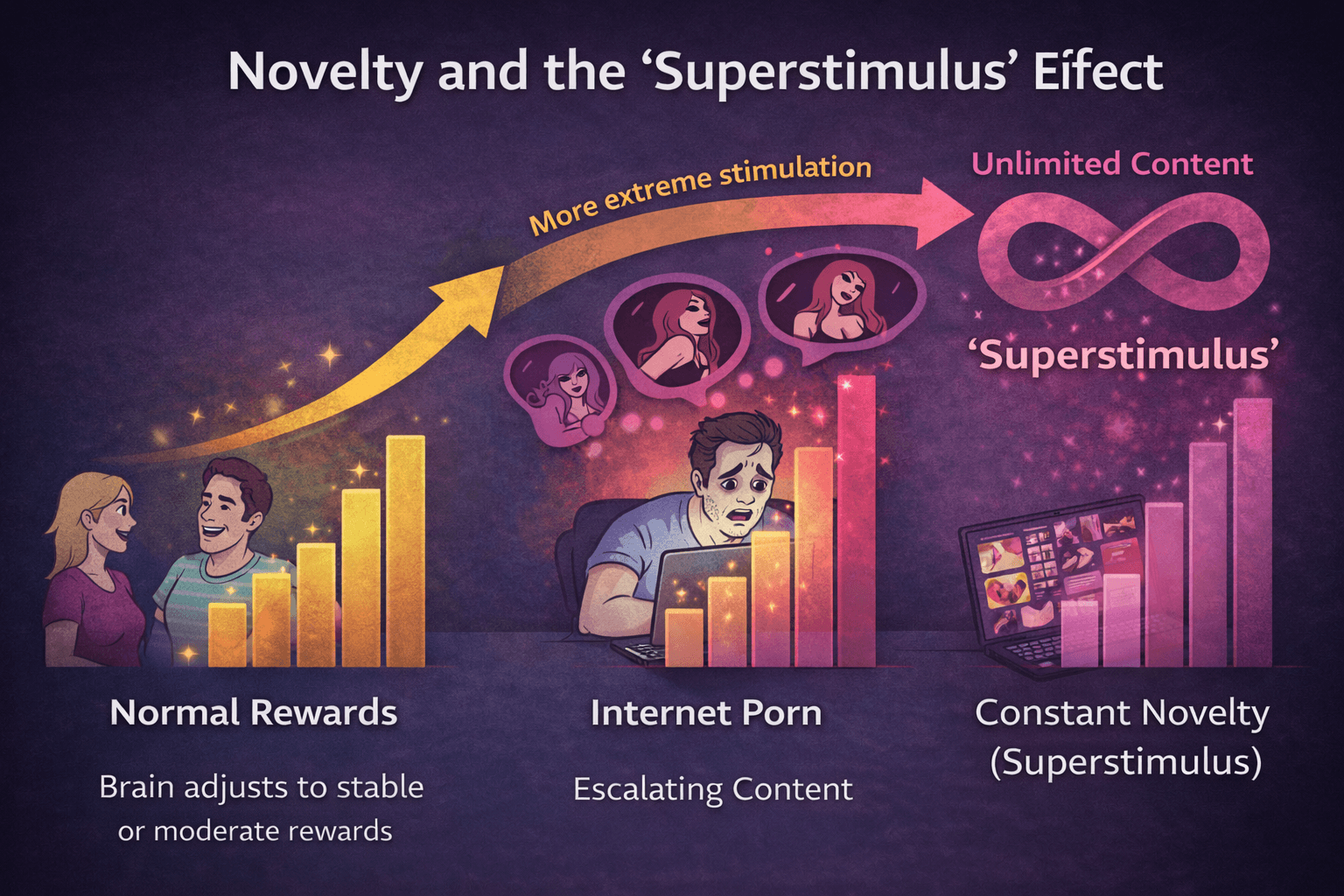
One feature that distinguishes internet pornography from many other rewarding behaviors is novelty.
The brain is especially responsive to new and varied stimuli, and pornography platforms often provide an unlimited stream of novel content.
This constant novelty can keep the reward system engaged longer and more intensely than many real-world experiences.
As a result, some people notice that they spend more time searching, escalate content, or feel less satisfied by material that once felt stimulating. This does not mean the brain is permanently damaged, but it does reflect how strongly the brain can adapt to repeated patterns of stimulation.
Changes in Self-Regulation and Sensitivity
With ongoing compulsive use, the balance between reward-driven impulses and self-regulation can shift. The brain areas involved in planning, impulse control, and long-term decision-making may become less effective at moderating urges in the moment, especially under stress or fatigue.
At the same time, sensitivity to non-porn rewards—such as everyday pleasures or real-life intimacy—may decrease.
These changes help explain why many people feel “stuck” in patterns they genuinely want to stop. Importantly, they also explain why recovery focuses on reducing cue-driven behavior, restoring balance to the reward system, and rebuilding self-regulation skills—rather than relying on willpower alone.
Is Porn Addiction a Real Diagnosis? (DSM-5 vs ICD-11 CSBD)
The Diagnostic and Statistical Manual of Mental Disorders, 5th edition (DSM-5) does not recognize pornography addiction as a formal diagnosis. However, survey data and self-reports suggest that a meaningful subset of men experience significant distress related to pornography use.
How Common Is Compulsive Porn Use? (What surveys show)
11% of men in a national survey reported they were “addicted to pornography” (Grubbs et al. 2019)
A 2022 report by Common Sense Media reported that 71% of teens had viewed pornography in the past week.
A 2021 analysis of a national probability survey from Sweden showed that 17% of men ages 16-24 watched pornography at least once a day (Malki et al., 2021).
Many men even report changes in their sexual responses, motivation, focus, and ability to enjoy real intimacy.
Porn Use and Sexual Function (What we know, what we don’t)
Some clinicians and researchers have raised concerns about rising rates of erectile dysfunction among younger men, with several hypotheses proposed to explain this trend, including—but not limited to—psychological factors, lifestyle changes, and patterns of pornography use.
Consider the following reported trends related to erectile dysfunction in younger men:
In 2012, Swiss researchers found Erectile Dysfunction (ED) rates of 30% in a cross-section of Swiss men aged 18 to 24 (Mialon et al., 2012).
In 2013, Italian researchers found that 1 in 4 men under the age of forty have reported some type of erectile dysfunction (Capogrosso et al., 2013).
NHS psychosexual therapists say that “more and more men in their late teens and early 20s are suffering from erectile dysfunction.”
The International Classification of Diseases, published by the World Health Organization, includes Compulsive Sexual Behavior Disorder (CSBD).
CSBD describes a persistent pattern of difficulty controlling intense sexual impulses or urges that lead to repetitive behaviors and cause significant distress or impairment in daily life. Compulsive pornography use may fall under this broader category when it meets those criteria.
Diagnosis and lived experience are not the same thing. Many men experience loss of control, distress, relationship strain, or emotional and physical consequences related to pornography use, even if they do not meet formal diagnostic thresholds.
For this reason, treatment does not depend on whether someone “qualifies” for a specific diagnosis.
Evidence-based approaches target the underlying patterns of addiction—such as habit loops, emotional regulation, cue-driven urges, and coping strategies—rather than the label itself. The goal is to reduce harm, restore choice and flexibility, and improve quality of life, regardless of terminology.
Understanding this distinction helps explain why recovery resources often emphasize behavior change or even present conflicting classifications, but what matters most is whether pornography use is causing problems—not debating whether it’s officially a diagnosis.
From there, we can figure out what are the best steps to address the problem effectively.
Signs Your Brain Is Adapting During Recovery
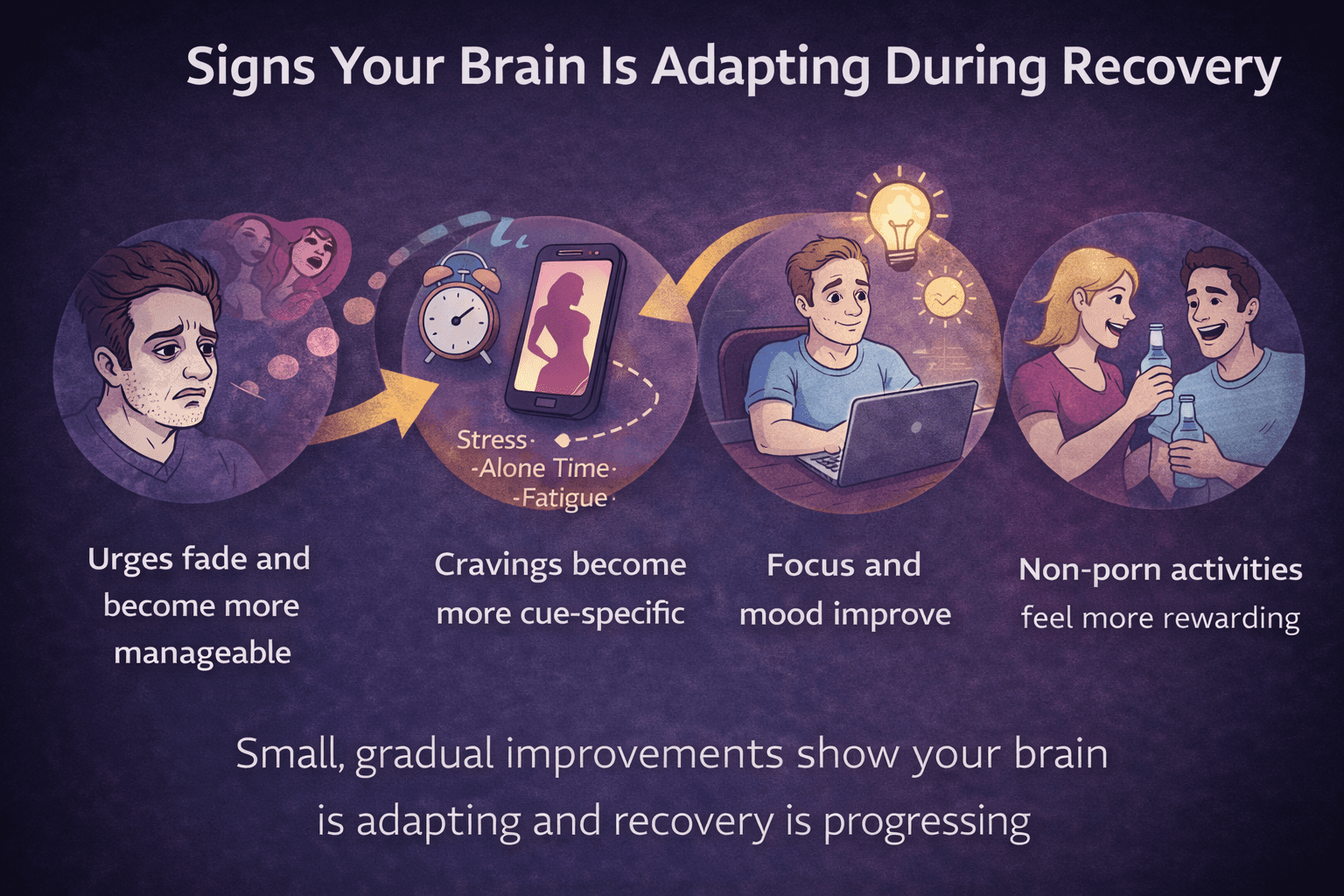
As time passes after you’ve stopped watching pornography, it’s natural to look for signs that recovery is happening and you’re getting better.
While experiences vary and no single change is guaranteed, several commonly reported patterns seem to indicate that the brain is beginning to heal and adapt to new behaviors.
These changes often appear gradually and may fluctuate rather than improve in a straight line. I’ve listed the scientific explanation after for interested readers.
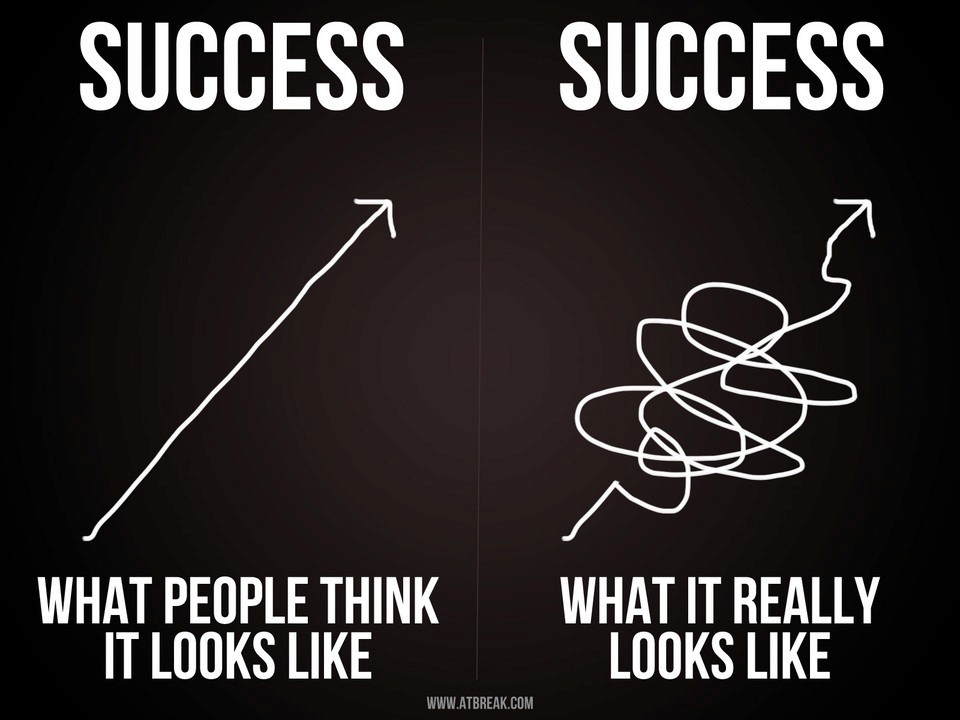
Cravings Become Less Constant
Early in recovery, urges to use pornography can feel frequent or persistent, sometimes appearing without a clear trigger. This is okay and to be expected, as your brain is getting used to no longer watching porn.
What science says about reduced cravings for porn after brain reset
Compulsive pornography use is associated with reduced impulse control due to an imbalance between reward-driven brain circuits and executive control systems. Neuroimaging studies of addiction consistently show heightened activity in limbic and striatal regions involved in motivation and craving, alongside diminished function in prefrontal areas responsible for self-regulation, planning, and inhibitory control.
When urges arise, this imbalance makes responses more automatic and less reflective, reducing the ability to pause or choose alternative actions (Bechara, 2005; Goldstein & Volkow, 2011).
Instead of triggering immediate action, urges become internal experiences that can be observed, tolerated, or redirected. This shift reflects neuroplastic changes rather than simple increases in willpower (Volkow et al., 2016; Kober et al., 2010).
As the brain regains the capacity to interrupt habitual responses, individuals can deploy coping strategies—such as delaying action, changing environments, or refocusing attention—more effectively.
Over time, repeated successful inhibition further reinforces prefrontal control, creating a stabilizing feedback loop in which urges lose their dominance and decision-making becomes more aligned with long-term goals rather than short-term relief.
Urges Become More Cue-Specific
Urges are often more clearly linked to identifiable cues—such as stress, boredom, fatigue, loneliness, or being alone with a device—rather than feeling random or uncontrollable. This increased specificity is a meaningful change because cue-based urges are easier to anticipate, plan for, and manage.
What science says about cues for porn after brain reset
Repeated pornography use pairs otherwise neutral cues with dopamine release in the mesolimbic pathway, particularly the ventral striatum. Over time, these cues acquire incentive salience, meaning they begin to provoke urges even in the absence of conscious desire or enjoyment (Robinson & Berridge, 2008; Volkow et al., 2007)
Repeated exposure to cues without reinforcement weakens the conditioned response through a process known as “extinction learning,” reducing both the intensity and automaticity of urges (Schultz, 2016; Berridge & Robinson, 2003). This process explains why triggers may still be noticed but gradually lose their ability to compel behavior.
Reduced cue-reactivity is also supported by changes in cognitive control networks.
Chronic compulsive behavior is associated with impaired prefrontal cortex regulation and heightened limbic reactivity. Sustained abstinence and behavioral change are linked to improved functioning in prefrontal regions involved in impulse control, decision-making, and emotional regulation.
As top-down control strengthens, you become better able to tolerate urges without acting on them, further weakening the cue-craving loop (Goldstein & Volkow, 2011; Bechara, 2005).
Finally, stress-related cues—which often play a central role in compulsive pornography use—lose potency over time as alternative coping pathways develop.
Early in recovery, stress and boredom can strongly activate craving. The longer you go without watching pornography, the less the brain relies on it as a stress regulator, and stress-induced activation of porn-related memory networks diminishes (Koob & Volkow, 2016; Sinha, 2008).
Improved Focus and Emotional Regulation
Some people report improvements in concentration, motivation, or emotional stability as the brain recalibrates. This might show up as better focus at work, greater engagement in daily activities, or an increased ability to tolerate uncomfortable emotions without immediately seeking distraction or relief.
These changes are often subtle at first and may be interrupted during periods of stress, but they can signal strengthening self-regulation over time.
What science says about reduced cravings for porn after brain reset
Compulsive pornography use is associated with reduced sensitivity to everyday rewards, a phenomenon often described as reward system desensitization. Repeated exposure to highly stimulating, novelty-driven sexual content produces frequent and intense dopamine signaling in the brain’s reward circuitry.
Over time, this can blunt responsiveness to lower-intensity but biologically meaningful rewards such as social interaction and physical activity. As a result, ordinary pleasures may feel muted or unrewarding compared to the artificial stimulation provided by pornography (Volkow et al., 2010; Kühn & Gallinat, 2014).
As compulsive use decreases, this imbalance begins to correct. This recalibration improves the brain’s ability to register reward from naturally reinforcing activities.
Neuroimaging and behavioral research suggest that recovery is associated with increased sensitivity to reward prediction, greater motivation for real-world goals, and improved engagement with social and physical environments (Volkow et al., 2017; Blum et al., 2012). Importantly, this process unfolds gradually, reflecting neuroplastic changes rather than sudden shifts in mood or motivation.
Improved reward sensitivity also reinforces recovery itself. As everyday experiences—such as exercise, creative work, meaningful progress, or emotional connection—become more satisfying, reliance on artificial reward sources diminishes.
Temporary Changes in Libido or Sexual Response
During recovery, temporary changes in sexual desire or arousal are sometimes reported. Libido may feel lower than usual for a period, or sexual responses may feel inconsistent.
These experiences are often referred to informally as a “flatline,” though this is not a clinical diagnosis and does not occur for everyone.
When they do happen, such changes are typically temporary and tend to resolve as the brain continues to adapt. They do not indicate permanent loss of sexual function or damage.
What science says about temporary loss of libido during recovery
Repeated exposure to highly stimulating sexual content can condition sexual arousal toward novelty-driven, artificial cues and away from lower-intensity, real-world stimuli.
When pornography use is reduced or stopped, the brain may temporarily show decreased sexual motivation as conditioned reward expectations weaken and dopaminergic signaling recalibrates. This period reflects adjustment within the brain’s reward and motivation systems rather than dysfunction or damage (Kühn & Gallinat, 2014; Volkow et al., 2017).
Importantly, available clinical and population-level evidence does not support the idea that stopping pornography use causes permanent loss of libido or irreversible sexual dysfunction.
Longitudinal and clinical observations indicate that sexual desire and responsiveness tend to stabilize as neuroadaptation continues, with many individuals reporting improved satisfaction and responsiveness over time.
When temporary libido changes occur, they are best understood as part of a reversible adjustment process rather than a sign of lasting harm (Prause & Pfaus, 2015; Wéry & Billieux, 2017).

How Long Does It Take to Reset Your Brain From Porn Addiction
There is no single timeline that applies to everyone when it comes to recovering from compulsive pornography use.
Brain adaptation happens gradually, and the pace varies depending on personal history, environment, and support.
That said, research on habit change, neuroplasticity, and behavioral recovery suggests that progress often follows recognizable stages.
These time ranges are general patterns—not guarantees—and individuals may move through them at different speeds or revisit earlier stages during periods of stress.
Days 1–14: Early Disruption and Adjustment
In the first one to two weeks, many people experience an increase in urges, irritability, restlessness, or emotional discomfort. These reactions often stem from the interruption of a well-established habit and the loss of a familiar coping mechanism.
During this period, the brain is adjusting to the absence of a behavior it previously relied on for stimulation or relief. Discomfort at this stage does not mean recovery is failing—it just reflects the brain responding to change.
Weeks 2–6: Cue Extinction Begins
After the initial adjustment period, urges often become more closely tied to specific cues, such as stress, boredom, fatigue, or certain environments. Mood may fluctuate, with periods of improvement followed by temporary setbacks.
This phase is sometimes described as the beginning of “cue extinction,” where the brain gradually learns that familiar triggers no longer reliably lead to the same reward. With consistent behavior change, urges may become shorter in duration and easier to tolerate.
Months 2–3: Improving Reward Sensitivity
Between two and three months, many people report improved responsiveness to everyday rewards, such as social interaction, exercise, or meaningful work. Automatic urges may become less frequent, and periods of mental clarity or emotional stability may increase.
While cravings can still occur, they often feel less overwhelming and more manageable during this stage.
Months 3–6: Habit Weakening and Stabilization
As recovery continues, the learned connection between triggers and pornography use tends to weaken further. New routines and coping strategies become more familiar, and self-regulation often improves.
During this phase, many people feel more confident in their ability to respond intentionally rather than reactively, even though challenges and stressors still arise.
Six to Twelve Months and Beyond: Maintenance and Resilience
Longer-term recovery focuses on maintaining gains, strengthening healthy habits, and building resilience to stress. Urges may still appear occasionally, but they are typically less intense and easier to manage.
At this stage, recovery is less about resisting urges and more about sustaining a balanced lifestyle that supports ongoing well-being.
Factors That Influence Recovery Time
Recovery timelines vary widely. Factors that can affect how long the process takes include:
Duration and intensity of use: Longer or more frequent use often requires more time for habits to weaken.
Age of onset: Habits formed earlier in life may take longer to change.
Stress levels: Chronic stress can intensify urges and slow recovery.
Co-occurring mental health conditions: Anxiety, depression, or trauma can influence both urges and coping capacity.
Understanding these variables helps set realistic expectations and reduces the tendency to interpret temporary setbacks as failure.
Stages of Brain Rewiring in Porn Addiction Recovery
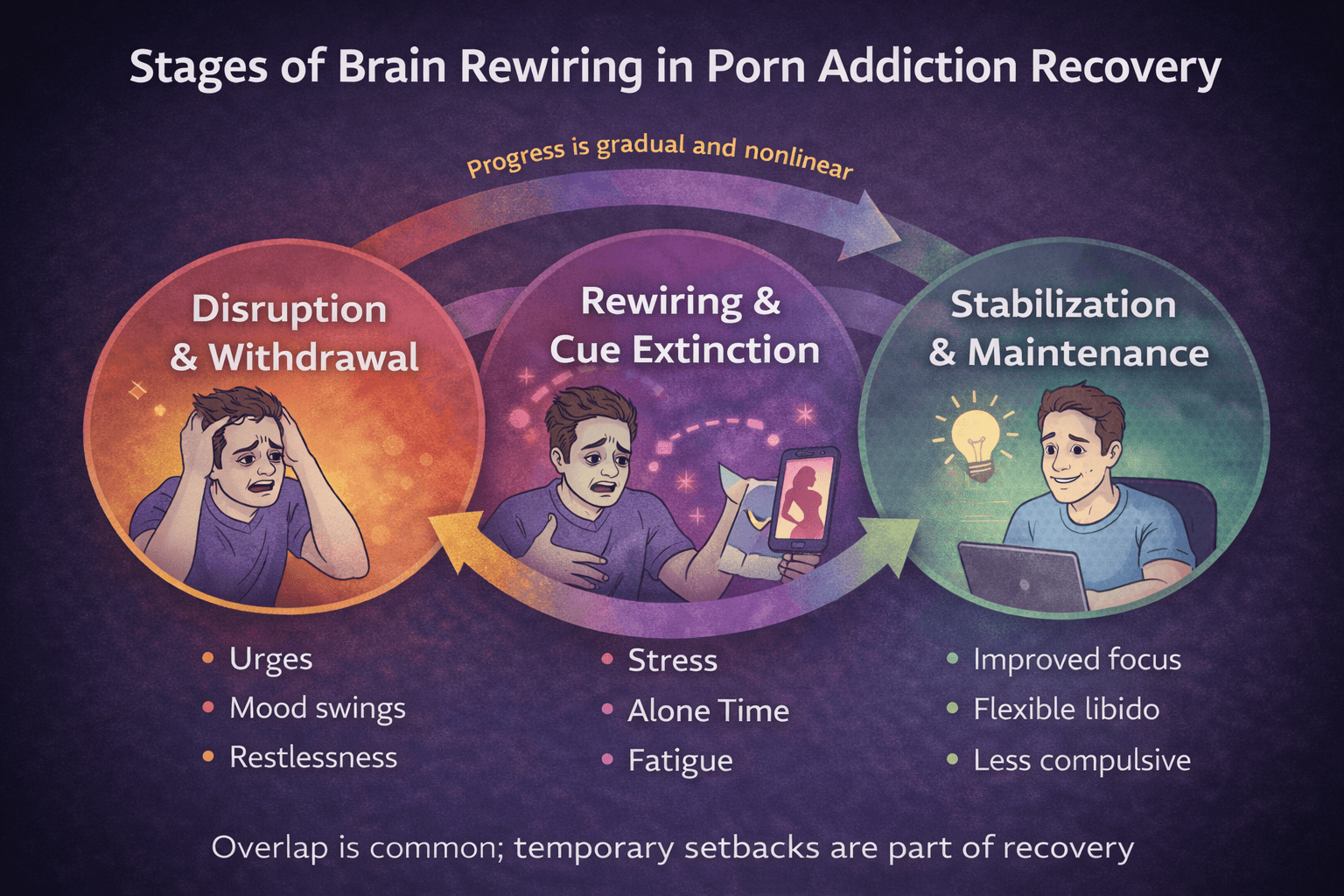
While recovery timelines vary, the brain often adapts through a series of overlapping stages. These stages are not rigid steps and may occur simultaneously or repeat during periods of stress. Understanding them can help normalize the recovery process and reduce confusion or self-blame when progress feels uneven.
Stage 1: Disruption and Withdrawal
The first stage begins when pornography use is reduced or stopped. During this period, the brain is adjusting to the absence of a familiar behavior that previously provided stimulation, relief, or distraction.
Common experiences during this stage may include:
increased urges or restlessness
irritability or mood swings
difficulty concentrating
a sense of discomfort or emotional flatness
These reactions are not signs of damage. They reflect the brain responding to a change in routine and learning that a long-established habit is no longer available. Support, structure, and patience are especially important during this stage.
Stage 2: Rewiring and Cue Extinction
As recovery continues, the brain begins to weaken the learned connection between specific cues and pornography use. Triggers may still appear, but they often become more recognizable and less overpowering.
During this stage, individuals often:
become more aware of patterns that drive urges
practice responding differently to stress or boredom
build alternative coping strategies
experience periods of progress mixed with setbacks
This phase is where much of the actual “rewiring” occurs. Each time an urge is tolerated without acting on it, or a healthier response is chosen, the brain reinforces new pathways that support self-regulation.
Stage 3: Stabilization and Maintenance
Over time, new habits and routines become more established. The brain relies less on pornography as a default response, and urges tend to lose intensity and frequency.
In this stage, recovery focuses on:
maintaining healthy routines
managing stress proactively
strengthening relationships and purpose
responding to occasional urges without panic
Stabilization does not mean urges disappear entirely. Instead, it reflects increased flexibility and resilience—the ability to experience urges without feeling controlled by them.
A Step-by-Step Plan to Reset Your Brain From Porn Addiction
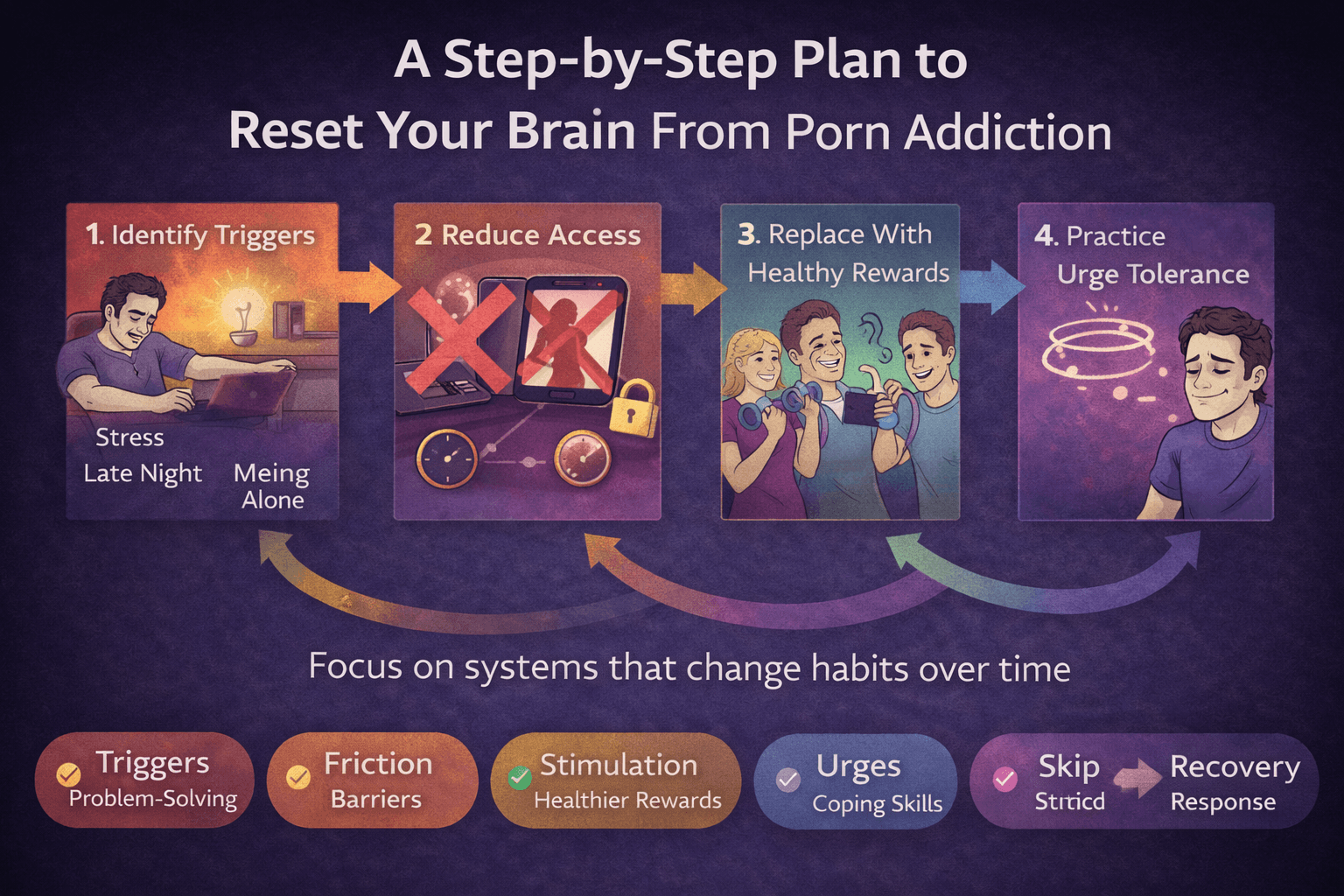
Resetting the brain from compulsive pornography use is less about forcing urges away and more about changing the conditions that allow those urges to run on autopilot. The steps below focus on weakening old habit loops while strengthening healthier patterns over time.
These steps work best when applied consistently and adjusted to individual circumstances.
1. Identify Triggers and High-Risk Patterns
Most compulsive behaviors are cue-driven. Triggers may include specific times of day, emotional states, environments, or devices rather than sexual desire itself.
Common triggers include:
stress or emotional discomfort
boredom or fatigue
being alone with a phone or computer
late-night screen use
Mapping these patterns helps shift recovery from self-blame to problem-solving. Instead of asking “Why am I like this?” the focus becomes “What situations reliably trigger urges, and how can I prepare for them?”
2. Reduce Access and Increase Friction
The brain tends to choose the easiest available option. Increasing friction between an urge and pornography use can significantly reduce impulsive behavior.
Examples include:
content blockers or filters
keeping devices out of private spaces
changing routines that involve late-night or isolated screen use
These steps are not about control or punishment. They are about giving the brain time and space to respond more intentionally.
3. Replace Porn-Based Stimulation With Healthier Rewards
Recovery is more sustainable when something meaningful replaces what is removed. Pornography often served as a source of stimulation, relief, or escape. Without alternatives, urges tend to persist.
Helpful replacements may include:
physical activity
creative work or learning
social connection
time outdoors or structured routines
These activities support the brain’s reward system and help restore sensitivity to non-porn sources of pleasure.
4. Practice Urge Tolerance and Response Skills
Urges do not need to disappear for recovery to progress. Learning to tolerate them without acting is a critical skill.
Evidence-based approaches often emphasize:
noticing urges without judging them
allowing urges to rise and fall naturally
redirecting attention rather than suppressing thoughts
This process helps retrain the brain that urges are temporary signals, not commands.
5. Build a Relapse Response Plan
Setbacks can occur, especially during stress or fatigue. A relapse response plan helps prevent a single lapse from turning into a return to old patterns.
An effective plan may include:
acknowledging the lapse without self-criticism
identifying what triggered it
returning to structure immediately
reaching out for support if needed
Viewing setbacks as data rather than failure supports long-term progress.
Further reading: How to create a relapse prevention plan that works
What Speeds Up Brain Recovery (and What Slows It Down)
While the brain’s ability to adapt does not depend on perfection, certain factors can make recovery more stable and sustainable. These influences don’t work as shortcuts, but they can either support or interfere with the brain’s ability to form healthier patterns over time.
Factors That Support Faster, More Stable Recovery
Consistent sleep
Sleep plays a central role in emotional regulation, impulse control, and learning. Irregular or insufficient sleep can intensify urges and reduce the brain’s ability to manage stress. Improving sleep consistency—rather than aiming for “perfect” sleep—often makes urges easier to tolerate.
Regular physical activity
Exercise supports mood regulation, stress reduction, and overall brain health. It also provides a non-porn source of reward and stimulation. The goal is not extreme training, but regular movement that can be sustained over time.
Stress management skills
Because stress is a common trigger for compulsive behaviors, learning to manage it effectively can significantly reduce relapse risk. This may include relaxation techniques, structured downtime, or cognitive strategies that help prevent emotional overload.
Social connection and accountability
Isolation tends to strengthen compulsive habits, while connection weakens them. Supportive relationships—whether with friends, partners, groups, or professionals—help reduce shame and provide perspective during difficult moments.
Meaningful structure and purpose
Recovery is often more stable when daily life includes routines and activities that feel purposeful. Meaningful work, learning, or contribution can shift the brain’s focus away from short-term relief and toward longer-term goals.
Factors That Can Slow Recovery
Chronic stress or burnout
Ongoing stress without adequate recovery time can keep the brain in a reactive state, making urges feel more intense and persistent.
Inconsistent routines
Large swings in sleep, work schedules, or daily structure can make habit change harder by increasing unpredictability and fatigue.
Shame-based self-talk
Harsh self-criticism after urges or setbacks often reinforces the very patterns recovery aims to weaken. Compassionate, problem-solving responses tend to be more effective.
Trying to rely on willpower alone
Willpower fluctuates, especially under stress. Recovery tends to be more sustainable when supported by systems, environmental design, and skills rather than constant self-control.
Therapy and Support Options That Help Rewire the Brain
While many people make meaningful progress through self-guided changes, therapy and structured support can play an important role in recovery—especially when urges feel persistent, distress increases, or progress stalls. Professional support is not a sign of weakness or failure; it is often a way to gain tools that make change more sustainable.
Cognitive Behavioral Therapy (CBT)
Cognitive Behavioral Therapy is one of the most commonly used approaches for compulsive behaviors. CBT focuses on identifying patterns of thought and behavior that contribute to urges and replacing them with more effective responses.
In the context of porn addiction recovery, CBT may help individuals:
recognize triggers and high-risk situations
challenge unhelpful beliefs that fuel compulsive use
develop practical strategies to interrupt habit loops
strengthen problem-solving and self-regulation skills
CBT is typically structured and goal-oriented, making it well suited for habit-related concerns.
Acceptance and Commitment Therapy (ACT)
Acceptance and Commitment Therapy takes a different approach by focusing less on eliminating urges and more on changing how a person responds to them. ACT teaches skills for tolerating discomfort, reducing avoidance, and aligning behavior with personal values.
For many people, ACT is helpful because it:
reduces the struggle against urges
emphasizes flexibility over control
supports long-term behavior change even when urges persist
This approach can be especially useful for individuals who feel stuck in cycles of suppression and relapse.
Dialectical Behavior Therapy (DBT) Skills
DBT-based skills are often used when emotional regulation is a major challenge. These skills focus on managing intense emotions, tolerating distress, and improving interpersonal effectiveness.
When porn use is closely linked to emotional overwhelm, DBT techniques can help reduce reliance on compulsive coping behaviors.
Group Support and Accountability
Group-based support can provide structure, accountability, and normalization. Hearing from others who face similar challenges often reduces shame and isolation—two factors that can reinforce compulsive behavior.
Further reading: Porn addiction accountability partner
Support may come from:
therapist-led groups
peer support groups
structured online or in-person recovery programs
The most effective groups emphasize respect, confidentiality, and skill-building rather than judgment.
When Professional Help May Be Especially Helpful
Seeking professional support may be particularly important if pornography use:
feels difficult to control despite repeated efforts
causes significant distress, anxiety, or depression
interferes with relationships, work, or daily functioning
is connected to past trauma or unresolved emotional issues
A qualified mental health professional can help assess the situation and recommend appropriate next steps.
Relapse, the Chaser Effect, and Why Urges Can Spike
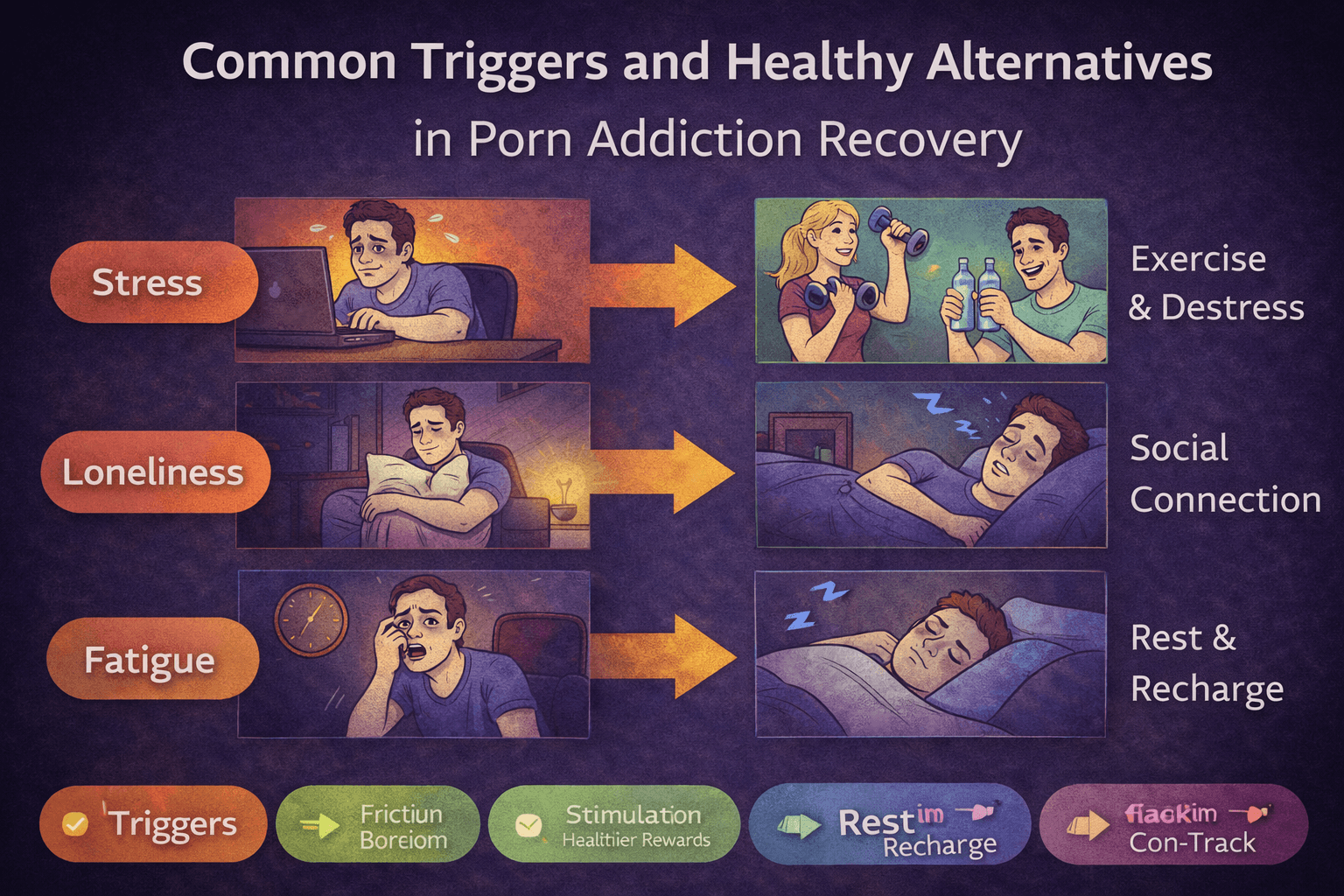
Even after making progress, many people are surprised when urges suddenly intensify. These spikes can feel discouraging, but they are a common and understandable part of recovery—and they do not mean the brain has “reset back to zero.”
Why Urges Can Increase After Sexual Stimulation
One reason urges sometimes surge is a phenomenon often referred to as the chaser effect. After orgasm—whether through sex or masturbation—the brain may temporarily experience heightened sexual desire and sensitivity to cues. This happens because sexual stimulation activates the same reward and learning systems involved in habit formation.
During recovery, this increased sensitivity can momentarily reactivate old associations between arousal and pornography, even if a person has no intention of returning to porn use. Importantly, this effect is typically short-lived and does not indicate a loss of progress.
Why Relapse Does Not Erase Brain Recovery
A single lapse or episode of pornography use does not undo weeks or months of behavioral change. Recovery is shaped by patterns over time, not by isolated moments. While repeated use can reinforce old habits, an isolated setback mainly provides information about which triggers or situations still need attention.
Interpreting relapse as total failure often leads to shame and discouragement—responses that can increase the likelihood of continued use. A more effective approach is to view setbacks as feedback rather than proof of inability.
Further reading: Porn relapse
How to Respond When Urges Spike
When urges intensify, especially after sexual activity or during stress, the goal is not to panic or suppress them aggressively. Helpful responses may include:
acknowledging the urge without judgment
delaying action and allowing the urge to peak and pass
returning quickly to structure and routine
reducing exposure to high-risk cues temporarily
reaching out for support if needed
Responding calmly and intentionally helps reinforce the brain’s learning that urges do not require immediate action.
Maintaining Momentum After a Setback
Progress is built through repeated choices, not perfection. Many people find that after a lapse, pornography feels less compelling or less satisfying than it once did—an indication that the habit loop is weakening.
Returning to established recovery practices as soon as possible helps prevent setbacks from turning into prolonged patterns. Over time, this approach strengthens resilience and confidence, even when challenges arise.
Frequently Asked Questions About Resetting Your Brain From Porn Addiction
How long does it take to reset your brain from porn addiction?
There is no fixed timeline that applies to everyone. Many people notice early changes within the first few weeks, such as urges becoming more situational rather than constant. More stable improvements often develop over several months as habits weaken and new coping strategies take hold. Long-term recovery focuses on maintenance and resilience rather than a final “endpoint.”
The pace of recovery depends on factors such as duration of use, stress levels, and available support.
Do dopamine levels return to normal after quitting porn?
Research suggests that the brain’s reward system can become more responsive to everyday pleasures over time when compulsive behaviors are reduced. Rather than thinking in terms of dopamine levels needing to “reset,” it is more accurate to think of the brain gradually recalibrating how it responds to different rewards.
This process happens through consistent behavior change, not overnight.
Is it okay to have sex while quitting porn?
For many people, partnered sex is compatible with porn recovery. However, experiences vary. Some individuals notice that sexual activity temporarily increases urges to view porn, especially earlier in recovery. Others find that healthy, present-focused intimacy supports their goals.
Paying attention to how sexual activity affects urges—and adjusting accordingly—is often more helpful than following rigid rules.
What is a “flatline,” and should I be worried about it?
“Flatline” is an informal term used to describe temporary changes in libido or sexual responsiveness that some people report during recovery. It is not a clinical diagnosis and does not happen to everyone.
When it does occur, it is usually temporary and tends to resolve as the brain continues to adapt. It does not indicate permanent loss of sexual function or damage.
Is porn addiction medically recognized?
Compulsive pornography use is not listed as a standalone diagnosis in some diagnostic manuals, but patterns of uncontrolled sexual behavior can still cause real distress and impairment. Clinical care focuses on how a behavior affects functioning and well-being rather than on labels alone.
If pornography use feels difficult to control or is interfering with your life, support can be appropriate regardless of terminology.
What if I relapse—does that mean I failed?
A setback does not mean recovery has failed or that progress has been erased. Habit change is shaped by patterns over time, not by single moments. Many people experience occasional lapses while learning to manage triggers and stress more effectively.
Responding to setbacks with problem-solving rather than self-criticism helps reduce the likelihood of
When to Seek Professional Help
Many people make meaningful progress through self-guided changes, education, and support from friends or communities. However, professional help can be an important part of recovery—especially when pornography use feels difficult to manage or begins to affect overall well-being.
Seeking support does not mean you have failed or that recovery is impossible on your own. Additional tools or structure may be helpful at this stage.
Consider Professional Support If Porn Use:
Feels difficult to control, even after repeated attempts to stop or reduce
Causes significant distress, shame, anxiety, or low mood that does not improve
Interferes with relationships, intimacy, work, or daily responsibilities
Is closely tied to stress, trauma, or emotional regulation difficulties
Leads to isolation or avoidance of social connection
Triggers compulsive patterns that escalate during difficult life periods
In these situations, a mental health professional can help identify underlying factors, strengthen coping strategies, and provide guidance tailored to your specific circumstances.
What Professional Help Often Focuses On
Treatment typically does not revolve around labels or moral judgments. Instead, it focuses on:
understanding triggers and habit patterns
improving emotional regulation and stress tolerance
strengthening impulse control and decision-making
rebuilding healthy routines and relationships
Approaches such as Cognitive Behavioral Therapy (CBT), Acceptance and Commitment Therapy (ACT), and other evidence-based methods are commonly used to address compulsive behaviors and support long-term change.
If You’re Unsure Where to Start
If you’re uncertain whether professional help is appropriate, speaking with a licensed therapist or healthcare provider for an initial consultation can provide clarity. Many professionals offer brief assessments or exploratory sessions to help determine next steps.
The most important consideration is not whether a behavior fits a specific label, but whether it is affecting your quality of life—and whether additional support like Relay could make recovery more manageable.
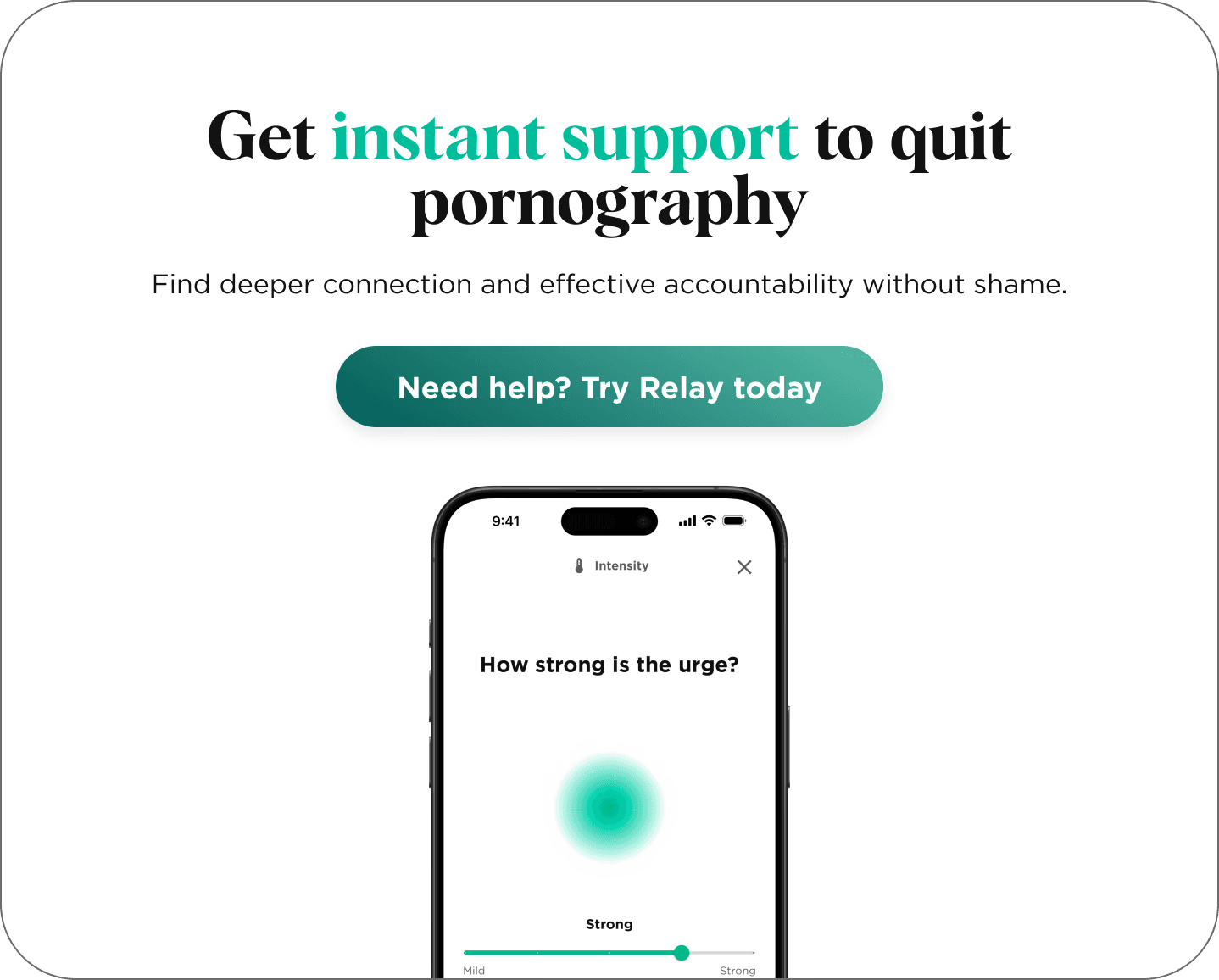
References
Grubbs JB, Reid RC, Bőthe B, Demetrovics Z, Coleman E, Gleason N, Miner MH, Fuss J, Klein V, Lewczuk K, Gola M, Fernandez DP, Fernandez EF, Carnes S, Lew-Starowicz M, Kingston D, Kraus SW. Assessing compulsive sexual behavior disorder: The development and international validation of the compulsive sexual behavior disorder–diagnostic inventory (CSBD-DI). J Behav Addict. 2023 Mar 13;12(1):242–260. doi:10.1556/2006.2023.00005. PMID: 36913189; PMCID: PMC10260208.
Grubbs JB, Kraus SW, Perry SL. Self-reported addiction to pornography in a nationally representative sample: The roles of use habits, religiousness, and moral incongruence. J Behav Addict. 2019 Mar 1;8(1):88–93. doi:10.1556/2006.7.2018.134. PMID: 30632378; PMCID: PMC7044607.
Malki K, Rahm C, Öberg KG, Ueda P. Frequency of pornography use and sexual health outcomes in Sweden: Analysis of a national probability survey. J Sex Med. 2021 Oct;18(10):1735–1751. doi:10.1016/j.jsxm.2021.08.003. PMID: 34526247.
Robb MB, Mann S. Teens and pornography. San Francisco (CA): Common Sense Media; 2023. Research report.
Mialon A, Berchtold A, Michaud PA, Gmel G, Suris JC. Sexual dysfunctions among young men: Prevalence and associated factors. J Adolesc Health. 2012 Jul;51(1):25–31. doi:10.1016/j.jadohealth.2012.01.008. PMID: 22727073.
Capogrosso P, Colicchia M, Ventimiglia E, Castagna G, Clementi MC, Suardi N, Castiglione F, Briganti A, Cantiello F, Damiano R, Montorsi F, Salonia A. One patient out of four with newly diagnosed erectile dysfunction is a young man—worrisome picture from everyday clinical practice. J Sex Med. 2013 Jul;10(7):1833–1841. doi:10.1111/jsm.12179. PMID: 23651423.
Prause N, Pfaus J. Viewing sexual stimuli associated with greater sexual responsiveness, not erectile dysfunction. Sex Med. 2015 Jun;3(2):90–98. doi:10.1002/sm2.58.
Bechara A. Decision making, impulse control and loss of willpower to resist drugs: A neurocognitive perspective. Nat Neurosci. 2005 Oct;8(11):1458–1463. doi:10.1038/nn1584.
Goldstein RZ, Volkow ND. Dysfunction of the prefrontal cortex in addiction: Neuroimaging findings and clinical implications. Nat Rev Neurosci. 2011 Nov;12(11):652–669. doi:10.1038/nrn3119.
Koob GF, Volkow ND. Neurobiology of addiction: A neurocircuitry analysis. Lancet Psychiatry. 2016 Aug;3(8):760–773. doi:10.1016/S2215-0366(16)00104-8.
Volkow ND, Koob GF, McLellan AT. Neurobiologic advances from the brain disease model of addiction. N Engl J Med. 2016 Jan 28;374(4):363–371. doi:10.1056/NEJMra1511480.
Berridge KC, Robinson TE. Parsing reward. Brain Res Rev. 2003 May;28(3):309–369. doi:10.1016/S0165-0173(02)00157-6.
Robinson TE, Berridge KC. The incentive sensitization theory of addiction: Some current issues. Philos Trans R Soc Lond B Biol Sci. 2008 Oct 12;363(1507):3137–3146. doi:10.1098/rstb.2008.0093.
Schultz W. Dopamine reward prediction error coding. Curr Opin Neurobiol. 2016 Jun;37:25–31. doi:10.1016/j.conb.2015.12.004.
Volkow ND, Fowler JS, Wang GJ, Swanson JM, Telang F. Dopamine in drug abuse and addiction: Results of imaging studies and treatment implications. Arch Neurol. 2007 Nov;64(11):1575–1579. doi:10.1001/archneur.64.11.1575.
Volkow ND, Wise RA, Baler R. The dopamine motive system: Implications for drug and food addiction. Nat Rev Neurosci. 2017 Dec;18(12):741–752. doi:10.1038/nrn.2017.130.
Kühn S, Gallinat J. Brain structure and functional connectivity associated with pornography consumption: The brain on porn. JAMA Psychiatry. 2014 Jul;71(7):827–834. doi:10.1001/jamapsychiatry.2014.93.
Sinha R. Chronic stress, drug use, and vulnerability to addiction. Ann N Y Acad Sci. 2008 Oct;1141:105–130. doi:10.1196/annals.1441.030.
Wéry A, Billieux J. Online sexual activities: An exploratory study of problematic and non-problematic usage patterns. Comput Human Behav. 2017 Apr;56:257–266. doi:10.1016/j.chb.2015.11.046.
BBC News. Pornography and the teenage brain. BBC Newsbeat. 2016 Sep 9.



